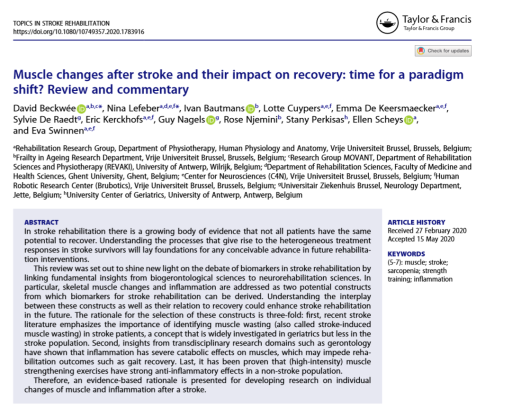
David Beckwée recently published a new paper!
Muscle changes after stroke and their impact on recovery: time for a paradigm shift? Review and commentary
By David Beckwée, Nina Lefeber, Ivan Bautmans, Lotte Cuypers, Emma De Keersmaecker, Sylvie De Raedt, Eric Kerckhofs, Guy Nagels, Rose Njemini, Stany Perkisas, Ellen Scheys and Eva Swinnen
ABSTRACT: In stroke rehabilitation there is a growing body of evidence that not all patients have the same potential to recover. Understanding the processes that give rise to the heterogeneous treatment responses in stroke survivors will lay foundations for any conceivable advance in future rehabilitation interventions. This review was set out to shine new light on the debate of biomarkers in stroke rehabilitation by linking fundamental insights from biogerontological sciences to neurorehabilitation sciences. In particular, skeletal muscle changes and inflammation are addressed as two potential constructs from which biomarkers for stroke rehabilitation can be derived. Understanding the interplay between these constructs as well as their relation to recovery could enhance stroke rehabilitation in the future. The rationale for the selection of these constructs is three-fold: first, recent stroke literature emphasizes the importance of identifying muscle wasting (also called stroke-induced muscle wasting) in stroke patients, a concept that is widely investigated in geriatrics but less in the stroke population. Second, insights from transdisciplinary research domains such as gerontology have shown that inflammation has severe catabolic effects on muscles, which may impede rehabilitation outcomes such as gait recovery. Last, it has been proven that (high-intensity) muscle strengthening exercises have strong anti-inflammatory effects in a non-stroke population. Therefore, an evidence-based rationale is presented for developing research on individual changes of muscle and inflammation after a stroke.
Check it out!
Full text available here.
